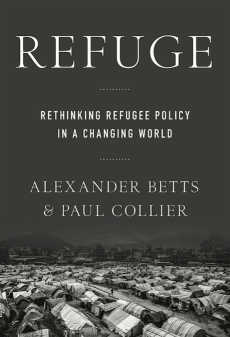
Refuge: Rethinking Refugee Policy in a Changing World
Alexander Betts & Paul Collier
288 pages, Oxford University Press, 2017
I spent March 2016 on Lesbos, the Greek island that became an entry point for refugees arriving in Europe. In the months before, thousands, primarily Syrians, had been landing on the island’s beaches each day with only what they could carry. They were met by people—some professionals and some volunteers—who were trying to help address pieces of a problem that extended far beyond the island. These refugees were the victims of catastrophic system failure.
In my work studying tech projects that aim to serve refugees, I see governments and others spending significant resources in the name of helping these people, not least where I live, in Germany. But the causes of the so-called refugee crisis are complex and structural, and its solutions must be as well. Without a systemic understanding of the problem, individual programs are likely just treating its symptoms rather than its root—or worse, they might be contributing to the problem. Gaining a deeper systemic understanding was my hope in reading this book.
In Refuge, Alexander Betts and Paul Collier, two professors at Oxford University, start with an analysis of what has gone wrong. They offer illuminating historical context and argue that our international institutions, developed to serve people fleeing persecution, are poorly suited to address the current source of most displacement: instability (whether economic, environmental, or political).
The authors delve into the European situation at length. The introduction opens with graphics showing refugee distribution in Europe, and one chapter dissects the various actions (and missteps) of European governments in 2015-16. Interspersed are asides lamenting how Eurocentric the discourse is, rightly pointing out that only a small fraction of displaced people worldwide have arrived on Europe’s shores. The authors do square this circle, but only in a later chapter. “The Syrian refugee crisis has created the first true opportunity for reform, not because of its unique severity, but because at its edges it had spilled over to Europe,” they write. “Thanks to the European refugee ‘crisis’ a rethink is at last possible.”
So what should this rethink consist of? The authors believe that at its center, it should involve “a paradigm shift … from a focus on vulnerabilities towards recognizing and building … capacities.” In other words, we should not view refugees as passive and helpless people who must be provided for. Doing so not only is hugely expensive but also compounds the tragedy, often leaving refugees stuck, sometimes for decades, in “transit” camps with little freedom and few prospects. Instead, we should harness the contributions that refugees can make to their host society, for the benefit of both sides.
This is an important point, although some of the ideas that Betts and Collier propose to reach this goal are contentious. Notably, they argue that refugees should mostly stay in regional sanctuaries—i.e., those countries neighboring the war zones; rich countries should help mainly with financial aid, rather than accepting large numbers of refugees themselves. Some of the arguments the authors deploy to justify this position will feel familiar to those who read Collier’s 2013 book Exodus. Syrian refugees, one argument goes, are well suited to work in Jordan, which is economically and culturally similar to their home country. By contrast, “Germany’s distinctive place in global production is entirely ill-suited to refugees from a poor country.”
The most prominent innovation the book proposes is the creation of “special economic zones” in regional sanctuaries, which would help create jobs for refugees there. The authors have already participated in setting up such a project in Jordan. Critics may argue that these initiatives could inadvertently encourage low-wage exploitation and question whether, if they also restrict onward migration, these zones would really be a major improvement on traditional long-term encampments. Even after the authors wave away concerns of worker exploitation as not a major risk, their vision places a lot of faith in the notion that providing an income—any income—would be a panacea. The argument appears to be that if refugees have an income, other dimensions of their well-being will resolve themselves, thanks to the power of the market and refugees’ entrepreneurial vim.
I fully agree with an approach that tries to empower refugees rather than just provide for them. But I would have hoped for a richer discussion of what else could contribute to an enabling environment for refugees’ well-being other than an income, including education, training, and other social services. The authors write that “[c]ultures of self-help and mutual support need to be encouraged” but do not really elaborate. What emerges, then, is a frustratingly thin vision for collective impact. Shortly before the end of the book, the authors write that civil society “offers an important and neglected contribution”—but up until that point they treat the role of the social sector with something between indifference and apparent suspicion, making dark but vague allusions to “vested interests.”
The book’s focus on allowing refugees to achieve long-term autonomy is welcome. So, too, is the attention to the obligation of rich countries toward the vast majority of refugees in poor countries, not just the small minority on their doorsteps. But the authors’ tendency to simplify diverse groups’ motives, and breezily to dismiss possible unintended consequences of their own proposals, casts some doubt on whether theirs is the grand systemic vision it aspires to be.

